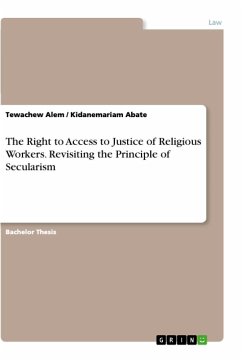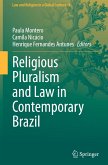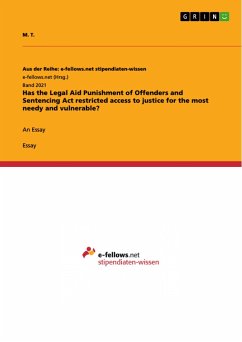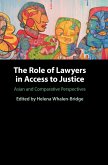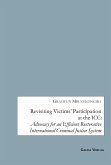Bachelor Thesis from the year 2017 in the subject Law - Comparative Legal Systems, Comparative Law, grade: A-, , course: Senior Thesis, language: English, abstract: This thesis strives to look into the legal and practical challenges that basically arise from the interaction between the right to access to justice and the principle of secularism with particular reference to the employees of the religious organizations. This paper discusses access to justice, its conceptual framework and as a human right under Bill of Rights and its elements under FDRE Constitution. The conceptual notion of secularism and its nexus with the right to access to justice in light of the Case laws and internationally developed principles to regulate the relation of religious organizations with their employees, who provide spiritual function. This thesis is basically a case study type and therefore it depends on court decision or case laws. And we conduct an interview to substantiate the case analysis method and also use primary as well as secondary data sources and purposive and snow boll sampling technique. The general objective is to examine how the right to access to justice of employees of religious organizations are entertained in tandem with the principle of secularism. The study attempt to answer the following question: Which legislation regulates the relationship of religious institutions with their workers? Does efficient dispute resolution mechanism is established within the religious institutions? Does the civil courts are legally competent to adjudicate disputes between the religious institutions and its employees? Do the decisions of Courts properly reconcile the right to access to justice and the principle of secularism? How the principle of secularism and the right to access to justice be applied in disputes that involve employees of religious organizations? This right of access to justice enshrined under UDHR, ICCPR, ICESCR, as a right to get administrative tribunal or judicial remedy when their fundamental rights is violated or restricted. It is also recognized under the FDRE constitution as one of the fundamental rights and freedom in accordance with art 37, provided that "everyone has the right to bring a justifiable matter to, and to obtain a decision or judgment by a court of law or any other competent body with judicial power."
Bitte wählen Sie Ihr Anliegen aus.
Rechnungen
Retourenschein anfordern
Bestellstatus
Storno

